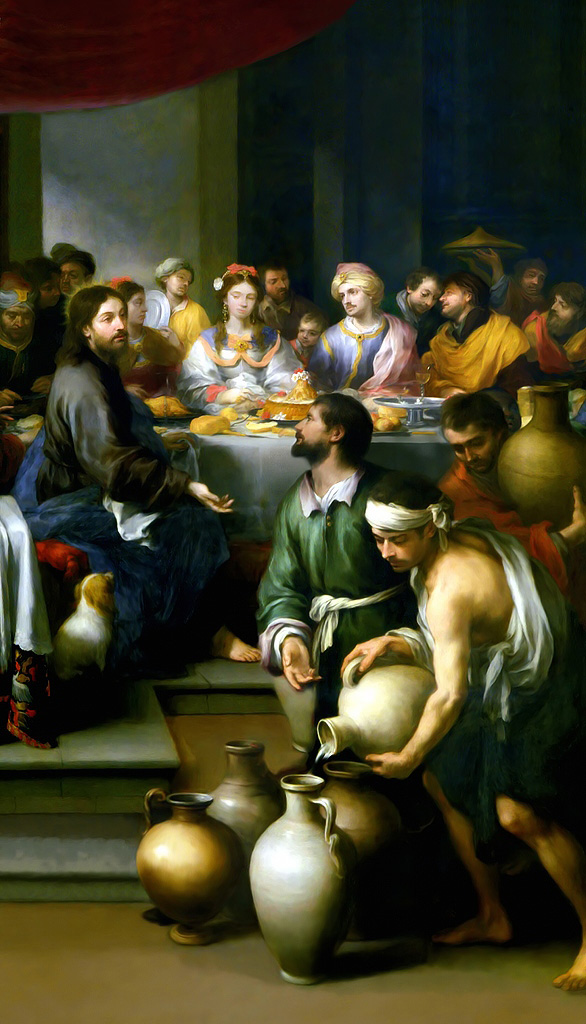Tonight, we are gathering to discuss the Wedding in Cana found in John 2:1-11. As we sing in the second half of verse 2 of our hymn: “and at Cana, wedding guest, in your Godhead manifest;/manifest in pow’r divine, changing water into wine.” As we read through John’s Wedding at Cana, the story is full of spiritual symbolism all pointing towards Jesus’s Crucifixion and Resurrection.
Time:
John’s narrative begins “On the third day.” This is the literal translation of the Greek. John is not telling us that this event happened three days subsequent to another event – either the calling of Nathaniel or the start of the wedding. John knows how to tell us about a subsequent event. See, John 20:26. Throughout the New Testament, “the third day” refers to the Resurrection, and therefore John is telling that this story is actually a story about the Resurrection, not simply a local wedding event. As we read this story, therefore, our mind’s eye should be looking through this story towards the end of the story and the Resurrection.
Later in the story when Mary tells Jesus they have no wine (see below), Jesus retorts “My hour has not yet come.” As we previously looked at in our study of the Passion Predictions in John, Jesus’s hour is the hour of his crucifixion and glorification. See particularly, John 12:23. For John, of course, salvation comes from the crucified and exalted Jesus. Therefore, when Jesus does provide the wine at the wedding, this action points towards the crucifixion and the shedding of Jesus’ blood.
Water and the Wine:
In Jewish thought, wine is a symbol of joy and celebration so that later rabbis held that “rejoicing can only be by drinking wine.“ God gives us wine to gladden our hearts. Ps. 104:15. But, now, John tells us, the wine has run out. John then tells in verse 6, that there were six stone jars used for Jewish purification rituals (that we discussed last week in connection with the baptism). These jars are empty as well. John is telling us that first-century Judaism is empty and has become devoid of joy and purity.
The servants fill the jars to the brim with water. The jars are to the point of overflowing. Jesus does not say anything over the jars or otherwise perform any action towards the jars, but jars of purification have become wine. In those jars, we have the Eucharistic wine that purifies the world of its sins. “Behold the Lamb of God who takes away the sins of the world.” John 1:29. Jesus is the good wine.
At the end of the story, the steward proclaims that the host has reserved the best wine for last. The first shall be last, and the last shall be first. The wine of the Jewish religious leaders – Pharisees, priests, and scribes – is exceeded by those who follow Jesus.
Woman:
In John’s telling, it appears that Jesus is being impertinent towards his mother. She asks him to do a favor and he responds by calling her “Woman!” v.4. The term used is gynai which does literally translate as “woman.” However, this term is generally used to denote a married woman or mother as opposed to an unmarried girl or maidservant. A more dynamic translation of the word would be “madam.” Jesus was not being disrespectful or curt towards his mother, but using a common polite term of respect. (We see something similar in Spanish where the word mujer means both “woman” and “wife.” Therefore, “Amy es mi mujer,” literally translates as “Amy is my woman” which also sounds curt and disrespectful in English.)
Dinner is at 6. Discussion at 6:45. The menu is caldo gallego. Please bring a friend. Hope to see you here.
And Jesus answered them, “The hour has come for the Son of man to be glorified. . . . And what shall I say? ‘Father, save me from this hour’? No, for this purpose I have come to this hour. Father, glorify thy name.” Then a voice came from heaven, “I have glorified it, and I will glorify it again.”
John 12:23, 27b-28

